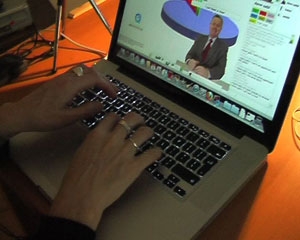2010-12-05
Participants
Helen Varley Jamieson & Paula Crutchlow – artists
Duration
2 hours
Time Frame
The work was developed during 2010, with previews and work-in-progress showings in July and October. The premiere performance started at 3pm in the UK, 4.30pm in Italy, and at whatever time it was for the approximately 40 online audience around the world.
Key Locations
Beaford Arts Centre, UK (where Paula was), an apartment in Torino, Italy (where Helen was, as part of MagFest Torino) and online
Technologies
UpStage plus 2 audio-visual streams (one from each of the houses where Paula & Helen were), presented in a bespoke interface. Audiences physically present in each of the houses saw a projection of this interface and could interact in the text chat via computers in the space. Online audiences saw the interface on their computer screens, and saw the audiences in each house in the streams.
make-shift is a unique live networked event where two ordinary houses are not only telematically connected, but are firmly engaged in the collaborative co-authoring of an event that discursively explores shared concerns around the global consequences of domestic politics. Screen-based media, physical performance and audience engagement are combined to create a magical theatrical experience. It is a light-footed and adaptable event that uses found household objects, recycling rubbish and internet technologies to speak about the fragility of ecological and human relationships.
The work happens simultaneously between two domestic houses and a bespoke online performance space that is freely available for anyone with a broadband connection to access. Performers Paula Crutchlow and Helen Varley Jamieson (one in each house) broker interaction between the local and remote audiences in the format of a performative salon. Moments of scripted and visually poetic performance are interspersed with webcam videography, digital imagery, avatar puppetry and audience participation, giving each audience a voice through audio-visual streaming and online chat. The online screen space is projected in each house as part of the on-site scenography. What is written in the chat is thus not just side commentary but a direct intervention which affects the reading and meaning of the work.
The make-shift performance structure is adaptable to various situations: connecting diverse socio-economic communities within a close geographical space; urban with rural; or two completely different countries and languages. Domestic settings mean that audiences for individual performances are necessarily small: 15-20 people at each house, plus the online audience (which is theoretically unlimited but likely to be about 50-60 connected computers). Small groups are essential to the conversational unfolding of the performance across the three spaces. This enables a light-footed connection between small communities of people which is also an active negotiation of difference; alongside the socio-political focus of the content it opens up a space for audiences to think deeply, discuss, shift their perceptions about relationships between local and global, and experience a sense of connection and community which leaves both physical and virtual traces.
The performance is given in English and lasts for approximately an hour and a half, including a “warm up” introduction for the audience. Ideally it should take place in an ordinary domestic home, “hosted” by the occupier of the house who will assist with certain things beforehand including providing photos and audio from their house for inclusion in the performance materials. The audience in both houses participate in group activities which contribute to the overall performance.

